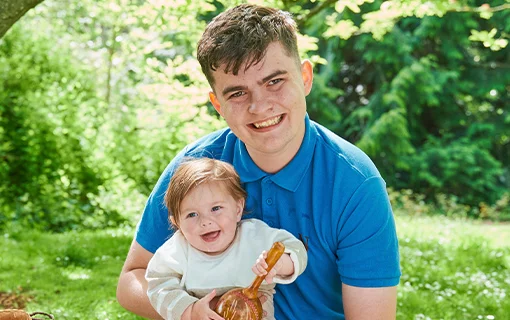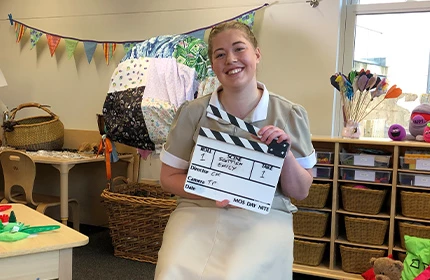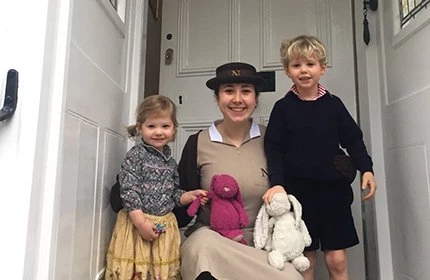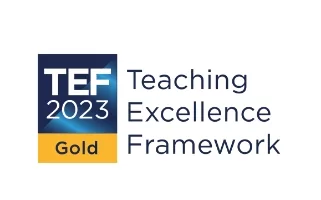You'll study a range of early childhood degree and diploma modules
Discover our early childhood training
Explore the degree and diploma modules you’ll study
Our undergraduate early childhood degree and diploma modules enable you to apply early years theory to practice and build your confidence through a wealth of hands-on experience in a range of early years settings. Each of the three years at Norland is divided into three trimesters with your time split between placement and study.
The early childhood degree modules have a range of common themes interwoven throughout the three years to allow you to develop as a practitioner and your pedagogical style. Find out more about the new degree in our Norland Unwrapped session.
In your third and final year at Norland, you’ll also be required to complete a dissertation on an early years topic of your choice. During the summer trimester of the third year, we focus on teaching you skills which will be relevant to your future employment. Read our blog written by third-year students on their employment weeks at the end of their degree training.
The final module of the diploma is the Newly Qualified Nanny (NQN) year, a 12-month probationary nanny post in paid full-time employment. No tuition fees are due in this final, fourth year of training.
View the modules below for our BA (Hons) Early Childhood Education and Care and Norland Diploma course.
All modules are core unless specified. Students will choose two optional modules each year.

Select a module to explore
- NC4201: The Developing Professional Practitioner
- NC4202: Practice in the Early Years 1: The Setting
- NC4203: Keeping Children Safe: Safeguarding and Child Protection
- NC4204: Learning, Development and Pedagogical Theory
- NC4205: Principles of Equality, Diversity and Inclusion
- NC4206: Introducing Self-Regulation
- NC4207: A Focus on Music, Drama and Theatre (optional)
- NC4208: A Focus on Practical Science, Technology, Engineering and Maths (STEM) (optional)
- NC4209: A Focus on Children’s Literature (optional)
- NC4210: A Focus on Sustainable Practice (optional)
- ND 1.1 Professional Skills 1
- ND 1.2 Basic Care Skills
- ND 1.3 Let’s Play!
- ND 1.4 Transitions 1
- F&N 1.1 Foundation Cooking Skills
- F&N 1.2 Cooking for and with Babies, Infants and Children
- Sewing 1.1 Machine and Hand Sewing
- Sewing 1.2 Child’s Apron
NC4201: The Developing Professional Practitioner
Qualification: Core degree module
Mode of delivery: 100% face-to-face
This module will instil the knowledge required by students embarking on a career in the early years industry, in order to develop their reflective skills and establish their professional identities. This is a process of lifelong learning, and as such the module will ask students to reflect on their communication skills, their ability to regulate and respond appropriately to conflict and feedback and establish aims for their future practice. This module is the first module of a three-part spiral across the three years of taught study at Norland, acting as a foundation for NC5201: Working Professionally with Parents and Carers and then NC6201: Developing Your Nanny Philosophy and provides the introduction to ethical practice and research skills for NC6204: Work Based Project.
The aims of this module are to develop students’ professional skills in observation and reflection in practice, embedding knowledge of good ethical practices. These skills will be used to develop professional research skills in support of lifelong learning and will involve respecting children as central to professional practice. Reflecting on professional communication and partnership working will help students to identify where their strengths lie, challenges that may arise and where improvements can be made to their personal practice. By the end of the module, students will have established a narrative of these elements through reflections on ethical practices and a child observation study. This will assist students in developing the generic skills set out in the QAA subject benchmark statements 3.4, alongside the specific skill of effective teamworking with parents/carers and other professionals, ethical practice, and research skills, as well as a range of graduate competencies.
NC4202: Practice in the Early Years 1: The Setting
Qualification: Core degree module
Mode of delivery: 4.95% face-to-face teaching / 95.05% work-based learning
Those studying the early years need opportunities to demonstrate skills that are underpinned by knowledge. By experiencing work-based placements in a setting such as a nursery or school, students can reflect on their abilities as professionals alongside demonstrating the Graduate Practitioner Competencies that they will evidence in preparation for a professional discussion. This module provides foundational knowledge and must be passed before embarking on NC5202: Practice in the Early Years 2: The Home.
This module aims to develop students’ foundational knowledge of legislation, regulation and safe working practices, so that they can go on to demonstrate this knowledge in placement. The module focuses on students’ experiences in placement, building observation, assessment and planning skills to support the learning and development of children. This is an opportunity to apply professional communication skills with peers, placement staff, children, parents and carers in different contexts, and students will identify and explain their strengths and areas for development in future practice.
NC4203: Keeping Children Safe: Safeguarding and Child Protection
Qualification: Core degree module
Mode of delivery: 100% face-to-face teaching
It is fundamental that early years practitioners are aware of legislative and statutory guidance for safeguarding and know what to do if they suspect a child is at risk of harm, as well as having knowledge of factors that might place children more at risk (ECSDN, 2021). While safeguarding principles will occur throughout modules, the core principles will be covered with students before they venture into placement, assessing them on their familiarity with the key policies and processes of safeguarding. This module is a pre-requisite for NC4202 Practice in the Early Years 1: The setting.
Practitioners are instrumental in keeping children safe and protecting them from harm, a central tenet of the Childcare Act 2006. This module will help students to identify the signs and symptoms of child abuse alongside the key factors that might make children more vulnerable. As part of this, policy and procedure will be explored to develop understanding of these principles, with students recognising their roles both as students and as qualified practitioners in ensuring that children in their care are and feel safe.
NC4204: Learning, Development and Pedagogical Theory
Qualification: Core degree module
Mode of delivery: 100% face-to-face teaching
Understanding the importance of how children learn and develop, along with how this is linked to theory, is core to a nanny’s work and the Early Childhood Studies benchmark statements. In order to provide appropriate play opportunities, students must firstly understand child development and the theory that frames it. This module will underpin the student’s understanding of child development and theory, an essential skill for working with young children and babies. It will also provide a foundation of child development and learning theories alongside pedagogical philosophies which will then be built upon in NC5204 Play: Exploring and Inventing at level 5.
Children’s minds work in mysterious ways, and many have sought to explain how they learn and how best adults can support them to do so. This module will explore the core theories of learning from the classical to the contemporary, as well as the pedagogical practices adults might employ to provide the very best early years environments to support those developing brains. These ideas will be used to rationalise and critique resources and get students thinking about the theories and pedagogies that most align with their professional values and practice.
NC4205: Principles of Equality, Diversity and Inclusion
Qualification: Core degree module
Mode of delivery: 100% face-to-face teaching
Equality, equity, diversity and inclusion will be a thread that runs through each module, because understanding children’s different characteristics is crucial when supporting not only the child but the family and community. This module will act as a foundation module that will be built upon within NC5205: Promoting Health in Practice. Inclusion in practice. Having a strong understanding of individuality and meeting children’s individual needs are pivotal to practice. Self-regulation will also be explored within an inclusive context and how good regulation can support communities and individuals to challenge and overcome bias. This module also interweaves elements for the NC4203: Keeping Children Safe: Safeguarding and Child Protection module, in which the rights and voice of the child will have been explored; these and the individual rights to inclusive practice will be discussed further.
Humanity is rich and varied: every individual has their own knowledge, values, experiences and abilities which are to be celebrated and respected. In this module, students will explore the policies that underpin early years practice of equality, diversity and inclusion, what these mean and how practitioners can uphold the rights of children and their families. How children can be educated to value and celebrate diversity and inclusion will form part of this, and students will explore how barriers to inclusion can be overcome to ensure equity for those for whom they will care, whilst also considering notions of anti-bias and anti-discriminatory practice.
NC4206: Introducing Self-Regulation
Qualification: Core degree module
Mode of delivery: 100% face-to-face teaching
Self-regulation is essential for healthy development. It lays the foundation for resilience and wellbeing, and enables us to regulate our feelings, our behaviour, our sleep, our eating and our thinking.
It is vital that students understand the theory and research behind children’s development of selfregulation, including what we can learn from the neuroscientific evidence, and the adult’s role as a coregulator within the ecosystem. The module will also enable students to understand the importance of their own self-regulation and its impact on their wellbeing and role as a nanny.
This module is the first of three modules that focus on the development of self-regulation. It acts as a foundation for NC5206: Supporting Children to Regulate Behaviour and then NC6205: Embedding Selfregulation into Practice through Play.
This module will introduce self-regulation and explore how self-regulation permeates all aspects of development. By the end of the module, students will understand that behaviours communicate the needs of children and that the development of self-regulation is a cumulative process. Students will learn about self-regulation theory from a holistic perspective, including the impact of the ecological system. They will begin to understand the neuroscience behind self-regulation, including the importance of children feeling safe and secure in their environments and relationships. In addition, they will recognise the role of the adult as co-regulator and begin to employ strategies to support children in developing self-regulation. They will also begin to explore their own self-regulation and the implications for their role as a nanny.
NC4207: A Focus on Music, Drama and Theatre (optional)
Qualification: Optional degree module
Mode of delivery: 100% face-to-face teaching
This module will support students to be creative and playful in their work by introducing other media to their practice, in this case, creative arts. Students will be encouraged to think about how music, dance, and drama can be employed to support children’s holistic development. This module will build on the knowledge gained in NC4204: Learning, Development and Pedagogical Theory.
Students will investigate, consider and evaluate, the value of music, drama and theatre arts and their potential benefits for children. Students will then experiment with a range of practices that can promote creative expression.
NC4208: A Focus on Practical Science, Technology, Engineering and Maths (STEM) (optional)
Qualification: Optional degree module
Mode of delivery: 100% face-to-face teaching
This module will support students to be playful in their approach to science, technology, engineering and mathematics (STEM). Students will be encouraged to think creatively about how their approaches to STEM can be embedded in their practice with children, and to demonstrate and explore how excitement can generate children’s engagement and learning. This module will build on the knowledge gained in NC4204: Learning, Development and Pedagogical Theory.
The aims of this module are to establish how learning theory can support children’s understanding and enjoyment of STEM subjects. Students will create a resource that explores these ideas and rationalise them with support from reading.
NC4209: A Focus on Children’s Literature (optional)
Qualification: Optional degree module
Mode of delivery: 100% face-to-face teaching
Although early literacy and phonics will be taught in NC4204: Learning, Development and Pedagogical Theory, this module will focus on practical ways to support children’s literacy and phonics.
Children are surrounded by language, and stories are the way many children are introduced to the written word. For some children, this will be a great joy that will lead them onto mark-making, then writing, but others might be a little more reluctant. This optional module will explore the mechanics of reading and writing and establish the strategies students can use to promote positive engagement with literacy.
NC4210: A Focus on Sustainable Practice (optional)
Qualification: Optional degree module
Mode of delivery: 100% face-to-face teaching
Sustainability has risen as a society-wide focus and as part of the Subject Benchmarks for Early Childhood Studies (2022), so students are challenged to establish sustainable practice in children’s learning and play. This module will build on the knowledge gained in NC4204: Learning, Development and Pedagogical Theory and consider how learning opportunities can promote environmental sustainability education in early childhood.
The module aims to engage students in conversation about environmental sustainability education and challenge early years educators – nannies specifically – to consider how principles and practices of sustainability can be embedded into their practice. The module will encourage students to actively seek ways to promote and engage children in environmental education for a sustainable future.
ND 1.1 Professional Skills 1
Qualification: Core diploma module
Mode of delivery: 100% face-to-face teaching
The purpose of this module is to support learning in the BA (Hons) module NC4201 The Developing Practitioner by identifying practical skills for communication that are needed in a professional setting. This module links to NC4202 Placement 1.1, enabling students to reflect on their practice. This module
will also act as a foundation for ND 2.1 Professional Skills 2, with links to ND 1.2 Basic Care Skills, in terms of how care actions can be recorded meaningfully for parents and carers, as well as for ND 1.3 Let’s Play!, which will look at how the importance of play can be communicated and used to document learning.
Communication is a fundamental skill for any early years practitioner, but especially those working in a home environment. In this module, students will examine and practise good communication in preparation for placement, with a focus on ensuring professional communication online, on the telephone and face to face. Students will also explore how to find and access work safely, the necessary processes they should follow in order to maintain professional boundaries, and what steps they can take if challenges arise.
ND 1.2 Basic Care Skills
Qualification: Core diploma module
Mode of delivery: 100% face-to-face teaching
This module will provide the solid foundation of practical skills needed for working with very young children that are fundamental to the role of the nanny. Students will be taught through practical demonstration and will be given time to practise, and to document the processes for their practice handbooks. These will then act as revision guides for the assessments, which will be practical skills demonstrations. Links will be made to ND 1.1 Professional Skills 1 and the BA (Hons) module NC4202 Practice in the Early Years: The Setting. The learning in this module should build confidence for students in practice and will be revisited in Trimester 3 of each year of training.
The aims of this module are to learn the basic care skills required of early years practitioners both in settings (T1) and in family homes (T2). Students will be assessed on following best practice processes when carrying out care routines and ensuring safety both at home and on the move.
ND 1.3 Let’s Play!
Qualification: Core diploma module
Mode of delivery: 100% face-to-face teaching
Play is at the centre of learning for children, and adults taking care of them need to know when to engage and when to step back. This module will consider the practical application of a variety of observation types undertaken in sessions. Heuristic play will be explored in order to establish the benefits of natural materials and real-life objects for children, as well as how schemas can be observed, assessed and used for effective planning. In summary, the students will establish their role in play and how it can be facilitated effectively, and the types of play considered in this module will vary depending on current trends in the early years industry. Links will be made to ND 1.1 Professional Skills 1 on the Norland diploma and with learning on the BA (Hons) modules NC4204 Learning, Development and Pedagogical Theory, and NC4205 Principles of Equality, Diversity and Inclusion.
This module looks at how play can be facilitated by early years professionals through an engaging environment. Students will learn observation skills and play types from cutting-edge research to support children’s curiosity and engagement with the world around them.
ND 1.4 Transitions 1
Qualification: Core diploma module
Mode of delivery: 100% face-to-face teaching
Children experience a range of transitions throughout childhood and a nanny should be there at every step to support and guide them through. The purpose of this module is to explore what a child may think, feel and experience when change occurs and the practical steps a nanny can take to support them and their families, in particular when a child is starting at a new setting such as a nursery or school, and how to support a child with separation anxiety. This module will link with Professional Skills 1 on the Norland diploma, and the two BA (Hons) modules NC4202 Practice in the Early Years: The Setting and NC4206 The Child’s Holistic Wellbeing so that learning here can be applied when in placement.
The purpose of the module is to explore what happens in children’s brains during the process of transition, and the practical steps that practitioners can take to support children through change both on a small horizontal scale and large vertical ones.
F&N 1.1 Foundation Cooking Skills
Qualification: Core diploma module
Mode of delivery: 67% practical face-to-face teaching / 33% online teaching
The focus of this unit is to develop basic cooking skills, a fundamental knowledge of the nutritional values of the foods used, and the safety and hygiene skills needed to prepare meals. Students will develop their cooking skills during the practical sessions following basic nutritious recipes. Each practical session is underpinned during the online lecture.
The aims of this module are to give students the basic knowledge, skills and confidence to prepare simple nutritious meals and develop an awareness of the main food groups. This unit will cover fundamental underpinning knowledge of the kitchen equipment and utensils and safe and hygienic practices when preparing food.
F&N 1.2 Cooking for and with Babies, Infants and Children
Qualification: Core diploma module
Mode of delivery: 67% practical face-to-face teaching / 33% online teaching
Students will expand on the skills and techniques from F&N 1.1. The overall focus is on weaning and meal planning to ensure that children and babies have a balanced diet. As babies can indicate intolerances or allergies when introducing new foods, students will complete an online allergy awareness course. The practical sessions are underpinned during the online lecture.
The aims of this module are to give students the basic knowledge, skills and confidence to introduce appropriate foods in a safe and timely way to developmentally ready babies. Students will also be able to prepare nutritious meals and further develop an understanding of the main food groups and the nutritional values of the foods used. This unit will reinforce knowledge of the kitchen equipment and utensils and safe and hygienic practices when preparing food.
Sewing 1.1 Machine and Hand Sewing
Qualification: Core diploma module
Mode of delivery: 100% face-to-face teaching
Through this unit, students will have the opportunity to develop their machine- and hand-sewing skills. They will produce a range of samples, learning skills beneficial to a home setting, such as taking up hems, sewing on buttons and name labels, and repairing holes in garments. They will gain confidence using new tools and equipment throughout.
Students will be guided through a range of hand- and machine-sewing techniques, creating samples of the methods covered.
Sewing 1.2 Child’s Apron
Qualification: Core diploma module
Mode of delivery: 100% face-to-face teaching
In this unit, students will have the opportunity to develop their machine- and hand-sewing skills through making a child’s apron. They will build on previous machine-sewing skills explored in the Machine and Hand Sewing module. New skills such as patchwork, colour theory and block printing will be explored, and students will be able to use these again in the second-and third-year modules.
Students are guided through pattern-cutting skills and machine- and hand-sewing techniques to create a child’s apron. Embellishment techniques will be explored through patchwork and printing.
Select a module to explore
- NC5201: Working Professionally with Parents and Carers
- NC5202: Practice in the Early Years 2: The Home
- NC5203: The Baby Years
- NC5204: Play: Exploring and Inventing
- NC5205: Promoting Health in Practice
- NC5206: Supporting Children to Regulate Behaviour
- NC5207: A Focus on Supporting Children to Understand Identity (optional)
- NC5208: A Focus on Trauma (optional)
- NC5209: A Focus on Multiple Childhoods (optional)
- NC5210: A Focus on Siblings (optional)
- ND 2.1 Professional Skills 2
- ND 2.2 Intermediate Care Skills
- ND 2.3 Playful Learning
- ND 2.4 Transitions 2
- F&N 2.1 Managing Family Cooking
- F&N 2.2 Cooking for Dietary Needs
- Sewing 2.1 Child’s Appliquéd Learning Resource
- Sewing 2.2 Fabric Friend
NC5201: Working Professionally with Parents and Carers
Qualification: Core degree module
Mode of delivery: 100% face-to-face teaching
The professional relationship between a nanny and their employers is complex, and getting this right means children get the very best care and support. Building on learning from NC4201 The Developing Practitioner and the ideas of the professional self, this module establishes how students can work with in the benchmark statements for the formation and promotion of mutually respectful relationships with parents and carers in the home environment. Learning in this module will provide a foundation for NC6201 Developing your Nanny Philosophy with respect to facilitating the needs of families. Concepts learned within this module, which focus on partnership working such as professional love, will also assist with the practice focused module NC5202: Practice in the Early Years 2: The Home, as students reflect on the perspectives of parents when inviting practitioners into their home.
This module will highlight potential concerns for parents when employing a nanny and ask students to use their own experiences to establish the key considerations parents use when making that decision. Professional love and communication in this context will be considered in detail, and students will reflect on the necessity of feedback and how this can be used for constructive professional development, whilst considering how conflict resolution techniques can be used to resolve differing opinions. These skills will be reflected upon within the research context as students apply these to interview skills and reflection.
NC5202: Practice in the Early Years 2: The Home
Qualification: Core degree module
Mode of delivery: 5.2% face-to-face teaching / 94.8% work-based learning
The home presents many opportunities as a living, working and learning environment for nannies and children. This module takes a holistic practical approach to caring for children in the home environment, building on learning from NC4202 Practice in the Early Years 1: The Setting, complementing learning from NC5201 Working Professionally with Parents and Carers. Learning here will also act as a foundation for NC6202: Practice in the Early Years 3: Supporting Families through Leadership.
The taught aspects of this module will link with second year placement experience to establish the complex role of the nanny: from meeting children’s physiological needs, to keeping them safe while promoting autonomy, to analysing how children’s preferences and abilities can be respected when providing play and learning experiences
NC5203: The Baby Years
Qualification: Core degree module
Mode of delivery: 100% face-to-face teaching
This module focuses on incredible changes that occur from conception; what happens in utero, the impact of birth; and the remarkable learning and development that occurs between birth and one year. Learning here will build on foundational theories and ideas established in NC4204: Learning, Development and Pedagogical Theory and NC4206: Introducing Self-regulation, with consideration of partnership working that begins in NC5201: Working Professionally with Parents and Carers to support new parents.
From the moment an egg is fertilised to the end of baby’s first year, an incredible amount of growth, learning and development takes place at a phenomenal rate. This module will examine the wide-ranging growth, learning and development that occurs between conception and the end of baby’s first year from a holistic perspective, as well as considering steps to be taken in the event of atypical development. Students will work as a team to recognise and articulate the growth, learning and development that takes place, the significance of their role, and identifying and examining the influence of parents/carers and the wider context. They will critically reflect on how practitioners can work with families and the wider ecosystem, to inform and promote the holistic development of babies as they grow, with sensitivity and professionalism.
NC5204: Play: Exploring and Inventing
Qualification: Core degree module
Mode of delivery: 100% face-to-face teaching
Fundamental to Early Childhood degrees is that students have a critical understanding of theory in practice and how this can support children’s learning and development. This module will build on NC4204: Learning, Development and Pedagogical Theory, and apply this to the home environment in which students will be working. The module works in conjunction with learning from NC5203: The Baby Years, in order to build an understanding of theories of development and how the environment can complement a child’s individuality and curiosity.
Children have an intrinsic motivation to explore, and this, coupled with a rich imagination, makes for interesting inventions! This module will explore pedagogical and philosophical approaches that emphasise the importance of play, playfulness and experiential learning. This will be applied to the home environment, including outdoor play, in promoting a child’s natural curiosity while celebrating their individuality. Students will synthesise this knowledge to justify their own environment and reflect on which pedagogies, philosophies and theories most represent their early years practice.
NC5205: Promoting Health in Practice
Qualification: Core degree module
Mode of delivery: 100% face-to-face teaching
The subject specific skill of supporting children’s learning and development with consideration of health and to support holistic wellbeing is the primary rationale for this module which builds on learning from NC4205: Principles of Equality, Diversity, and Inclusion, to consider the role of the nanny in supporting children to flourish. This module will also act as a foundation for NC6203: Children’s Worlds Today as it explores how individual needs and the wider context influence of lived experiences and how nannies can help children develop healthy lifestyles.
This module aims to equip students with a critical insight into the health needs of children, as well as an understanding of authentic inclusion of children with long term health conditions and the role of the nanny in promoting holistic wellbeing. The social and medical models of health will be explored with opportunities to apply these in a variety of contexts. Factors affecting physical health are considered within the context of wider health issues and multi-agency working. The assessment will ask students to respond to a case study so that theory can be applied to practice, and students will be equipped with the knowledge on how to support children and families in their future career to adopt healthy lifestyles.
NC5206: Supporting Children to Regulate Behaviour
Qualification: Core degree module
Mode of delivery: 100% face-to-face teaching
Have you ever wondered why children behave the way they do? All behaviour is a form of communication and children are developing self-regulation over many years. As adults, we need to enable children to work out what to do when they feel overwhelmed with emotions and use strategies to support them. Students need to understand the impact that approaches such as behaviourism and relational practice have on children and develop their skills when supporting children to regulate behaviour, as well as how their own ability to self-regulate affects their responses to children’s behaviour. This module is the second of three modules and builds on the foundation of NC4206: Introducing Self-regulation and is a pre-requisite for NC6205: Embedding Self-regulation into Practice Through Play.
This module will build on the knowledge of self-regulation with a particular focus on social and emotional self-regulation, building on students’ understanding of the wider context of the ecosystem. There will be opportunities for students to critically analyse learning theory related to behaviour and deepen their understanding of the neuroscientific process of self-regulation. Students will explore the importance of sensory integration for both neurotypical and atypical development. They will also reflect on how their own values, attitudes and beliefs are shaped by their own experiences and the wider socio-cultural, eco-political context. By the end of the module, students will understand how social and emotional self-regulation and sensory integration lay the foundation for cognitive self-regulation and wellbeing. Students will also explore a range of practical strategies to support children to regulate their behaviour and consider how their own self-regulation may affect how they support children to self-regulate.
NC5207: A Focus on Supporting Children to Understand Identity (optional)
Qualification: Optional degree module
Mode of delivery: 100% face-to-face teaching
Building on the learning from NC4205: Principles of Equality, Diversity, and Inclusion and NC5205: Promoting Health in Practice, this module provides an in-depth exploration of self and identity in relation to protected characteristics to prepare students for supporting the development of self for children in today’s society.
The aim of this module is to explore theoretical perspectives of self and identity in order to understand how nannies can celebrate and promote confident children. Current issues of identity will also be explored through media, with debates centred around the challenges posed by societal expectation and how these can be overcome.
NC5208: A Focus on Trauma (optional)
Qualification: Optional degree module
Mode of delivery: 100% face-to-face teaching
Trauma can be experienced by any child, and thus it is important that a nanny is equipped with the skills to respond and support children and families. Building on learning from NC4203: Keeping Children Safe: Safeguarding and Child Protection, NC4205: Principles of Equality, Diversity, and Inclusion and NC5205: Promoting Health in Practice, this module will provide an opportunity to look more closely at what constitutes trauma and the impact that this will have on families.
The purpose of this module is to explore the impact of adverse childhood experiences in detail, applying theory and understanding of trauma and its impacts. Students will also consider how they might – within a nanny role – support children who may have experienced trauma.
NC5209: A Focus on Multiple Childhoods (optional)
Qualification: Optional degree module
Mode of delivery: 100% face-to-face teaching
This module builds upon NC4205: Principles of Equality, Diversity and Inclusion. Childhood is constructed by society and, as such, is a changing notion. Children are connected to and develop understanding of their community and the world through their experiences, so it is essential to gain an insight into children’s lived lives and to consider diverse childhood experiences at both a global and local level. By drawing on children’s experiences with a focus on space and place, issues of social justice that affect children now and will do so in the future, such as sustainability, poverty and inclusivity, will be critically considered.
This module will enable you to understand and examine the notion of multiple childhoods. You will examine how childhood is constructed across space and place through an historic, social and political context. Using contemporary research and current media sources, you will develop critical understanding of multiple, global childhoods through examining issues of social justice.
NC5210: A Focus on Siblings (optional)
Qualification: Optional degree module
Mode of delivery: 100% face-to-face teaching
This optional module explores the relevance that sibling dynamics play within the wider scope of child development. This module builds upon NC4201: The Developing Professional Practitioner as it encourages continuance in practitioner learning and draws upon personal and professional experiences to develop an additional skillset within a niche realm of early years. In preparation for NC6203: Children’s World’s Today, students begin to learn to organise and communicate key information specific to sibling dynamics and contemporary world issues to effectively support families through a complexity of challenges should they arise.
From the moment a sibling bond is forged, the interactions that exist between siblings will impact how each of these unique individuals relate not only within the context of family but within the wider world. The module explores diverse interfamily experiences that are likely to include – but not be limited to –separations and attachment, rivalry and conflict resolution, parent influence, power and protection, with consideration of singletons and multiples throughout. This module aims to encourage students to contemplate their own sibling experiences, whether personal or professional. Through literature, critical analysis, and personal/professional reflections, students will examine various dynamics within families that influence sibling bonds and how these early experiences impact learning and development.
ND 2.1 Professional Skills 2
Qualification: Core diploma module
Mode of delivery: 100% face-to-face teaching
Building on ND 1.1 Professional Skills 1, this module will explore the professional practical documentation skills required for a nanny in the home environment. The learning in this module links with the Norland diploma modules ND 2.2 Intermediate Care Skills, F&N 2.1 Family Cooking and F&N 2.2 Cooking for Dietary Needs. On the BA (Hons), the learning will act as practical preparation for NC5202 Practice in the Early Years: The Home.
Documentation of routine and daily events will be explored as well as documenting learning in a way that values a child’s individuality and engages their families. Menu planning, accounting and recording accidents and medication will also be covered so that students going into their first family placement will have the knowledge and skills to communicate this information effectively. Conflict resolution will also be considered as part of this and how responding to feedback can be achieved constructively and professionally.
ND 2.2 Intermediate Care Skills
Qualification: Core diploma module
Mode of delivery: 100% face-to-face teaching
Building on ND 1.2 Basic Care Skills and integrating learning from the BA (Hons) modules NC4205 Principles of Equality, Diversity and Inclusion, and NC5205 Promoting Health in Practice, students will take their practical skills knowledge into the home and explore how they can meet a range of individual needs. Nannies need to know that not all hair requires the same care. In this module, students will learn what to do when headlice appear and the best tools for dealing with this. They will also learn how to ensure nails are trimmed and ears cleaned, how to support dental care, and how to manage that first trip to the dentist, all of which are fundamental to their practice. In the second half of the module, students will look at the practicality of sleep routines, bath times and mealtimes, with a view to promoting autonomy, choice and respectful behaviour.
This module aims to give students the skills to carry out the intermediate care skills required as a nanny, such as caring for hair, skin and teeth and maintaining a calm environment for promoting autonomy throughout a child’s daily routine. Students will explore tips and tricks for mealtimes and bedtimes and how to support parents in this.
ND 2.3 Playful Learning
Qualification: Core diploma module
Mode of delivery: 100% face-to-face teaching
Every nanny needs to find the fun in everything, and learning is no exception. Building on ideas from ND 1.3 Let’s Play!, students will explore the differences between true play and making learning fun and how enjoyment of learning opportunities can be facilitated. Consideration of early years curricula will also be explored along with this and how this can be applied in the home environment. Learning in this module ties in with the BA (Hons) modules NC5203 The Baby Years, NC5204 Play: Exploring and Inventing, and NC5205 Promoting Health in Practice.
The aims of this module are to look at practical activities that promote skills in the subjects of literacy, science, mathematics, engineering, drama, art and music. Observation will be considered alongside this, using provocative learning opportunities to facilitate learning, with consideration of the barriers to learning that the environment might provide for inclusion.
ND 2.4 Transitions 2
Qualification: Core diploma module
Mode of delivery: 100% face-to-face teaching
Building on learning from ND 1.4 Transitions 1, students will explore practical strategies for supporting children in the transitions from cot to bed and from nappies to potty to toilet. These are both transitions that students are likely to experience in placement and in future practice. The learning in this module links closely with ND 2.1 Professional Skills, ND 2.2 Intermediate Care Skills and the BA (Hons) module NC5206 Making Sense of Children’s Behaviour.
The aims of this module are to explore the key transitions and the strategies that support them in children’s homes. Students will learn the practical steps to take in supporting children from cot to bed and during toilet training, alongside the indicators that children are ready to make the change. Supporting parents with these transitions and managing conversations around these topics will also be explored and practised in the assessment.
F&N 2.1 Managing Family Cooking
Qualification: Core diploma module
Mode of delivery: 67% practical face-to-face teaching / 33% online teaching
The focus of this unit is to extend on cooking skills and planning well-balanced, nutritious and appealing family meals from previous units. In preparation for residential placements, this unit focuses on family meals, batch cooking, safe storage, freezing, thawing and reheating. Healthy lunches and picnic food will also be explored. Students will develop their cooking skills during the practical sessions with an extended variety of recipes. Each practical session is underpinned during the online lectures.
In your role as a nanny, you will need to use your time wisely. Being able to cook nutritious balanced meals for all members of the family is essential, as is being able to make best use of your available time by batch cooking, freezing, thawing and reheating meals safely. Fun day trips with tasty picnics are often required with children, and this unit aims to give you lots of ideas for safely stored nutritious packed meals.
F&N 2.2 Cooking for Dietary Needs
Qualification: Core diploma module
Mode of delivery: 67% practical face-to-face teaching / 33% online teaching
It is important to be able to cook for a large variety of families and individual family members. This unit covers some of the main dietary and religious requirements and how to cook tasty balanced meals and adapt recipes to cater for all. Students will develop their cooking skills during the practical sessions, extending their repertoire of nutritious recipes. Each practical session is underpinned during the online lectures.
The aims of the module are to give students the basic knowledge, skills and confidence to prepare nutritious meals to accommodate a range of dietary requirements, to be aware of the dietary requirements of pregnant and breastfeeding mothers and to consider cost-effective meal planning and using leftovers to minimise waste.
Sewing 2.1 Child’s Appliquéd Learning Resource
Qualification: Core diploma module
Mode of delivery: 100% face-to-face teaching
Using skills learned in their first year, students will expand their sewing skill set further with appliqué skills to create a learning resource for an early years setting. This will allow students to apply learning from ND 1.3 Let’s Play and ND 2.3 Playful Learning to a sewing project that can be used with children in practice.
Students will make a fabric learning resource using hand- and machine-sewing skills. They can choose to make either a cushion cover, a fabric book or a wall hanging. Appliqué will be the primary embellishment technique being taught and explored for this project; students may use other embellishment techniques to decorate the textile learning resource. Students will plan their design before using a new pattern-cutting technique of measuring out and drawing their item directly onto the fabric. Students will construct their item based on their design using new and previously learned techniques.
Sewing 2.2 Fabric Friend
Qualification: Core diploma module
Mode of delivery: 100% face-to-face teaching
Students will design and create a fabric friend and personalise it using hand embroidery.
In this unit, students will create a fabric friend, which can be used as a transitional toy. It is made using upcycled fabrics while continuing to build on hand- and machine-sewing techniques. Embellishment techniques will be explored, specifically focusing on hand embroidery.
Select a module to explore
- NC6201: Developing your Nanny Philosophy
- NC6202: Practice in the Early Years 3: Supporting Families Through Leadership
- NC6203: Children’s Worlds Today
- NC6204: Work Based Project
- NC6205: Embedding Self-Regulation into Practice Through Play
- NC6206: A Focus on Management and Leadership Skills in a Formal Household (optional)
- NC6207: A Focus on Supporting Loss (optional)
- NC6208: A Focus on Entrepreneurship for Nannies (optional)
- NC6209: A Focus on Growing with Children (optional)
- ND 3.1 Professional Skills 3
- ND 3.2 Advanced Care Skills
- ND 3.3 Playful Environments
- ND 3.4 Transitions 3
- F&N 3.1 Celebration Cookery
- F&N 3.2 Preparation for NQN
- Sewing 3.1 Fancy Dress
- Sewing 3.2 Children’s Quilted Blanket
NC6201: Developing your Nanny Philosophy
Qualification: Core degree module
Mode of delivery: 100% face-to-face teaching
A professional nanny needs to develop a robust pedagogical philosophy about their practice and professional self, drawn from research-informed best practice. A nanny philosophy will be derived from the evidence-based learning they have undertaken at Norland, from placements and their own childhood. The module draws together all previous learning, particularly NC4201 The Developing Practitioner and NC5201 Working Professionally with Parents and Carers. It also links with the modules related to self-regulation, highlighting the importance of nannies being able to self-regulate and be resilient.
This module will encourage students to look inwards as they establish the interpersonal skills and professional attributes they bring to working with families. They will synthesise their experiences and learning to conceptualise their own professional philosophy, have a clear rationale for its application and identify how this can be articulated to potential employers. They will also have a sound insight into how their professional role hinges upon their ability to self-regulate.
NC6202: Practice in the Early Years 3: Supporting Families Through Leadership
Qualification: Core degree module
Mode of delivery: 3.3% face-to-face teaching / 96.7% work-based learning
Working in the home environment can present a multitude of practical challenges for the child’s education and care network. This module emphasises the role of the nanny within the network by working in partnership with parents/carers and potentially a wider team to ensure the holistic needs of the child are met. This module builds on learning from NC5202 Practice in the Early Years 2: The Home.
This module aims to develop students’ leadership skills to enable them to form professional partnerships. The taught aspect of this module will link with placement experiences to fully establish the nanny role within the home environment as part of the child’s education and care network, supporting families through challenges, taking on a leadership role and implementing theoretical knowledge.
NC6203: Children’s Worlds Today
Qualification: Core degree module
Mode of delivery: 100% face-to-face teaching
A nanny must be aware of the world around them and the societal and cultural influences on the children and the families with whom they work. This module will build on NC4205: Principles of Equality, Diversity, and Inclusion as well as NC5201: Working Professionally with Parents and Carers. Students will be critically reflecting on their practice and evaluating whether this meets the demands of the modern world, including the context of globalisation.
Childhood varies through time and space, dependent on the environment or community in which a child lives, the political, economic or global influences that may impact them or the holistic health of the individual or those closest to them. This module will examine the contemporary world in relation to these factors and analyse the trends in parenting and family life which may impact working with families. Innovative education and care practices and provision will be critically assessed, and students will consider how key information can be shared to help children thrive in the contemporary world.
NC6204: Work Based Project
Qualification: Core degree module
Mode of delivery: 100% face-to-face teaching
The module is designed to facilitate empirical enquiry for students to successfully complete their honours degree and to embed the lifelong research skills that enables students to further develop their practice and understanding of the field. The module builds and expands upon the observation and interview-based practices in addition to the ethical principles explored and applied in NC4201 The Developing Practitioner and NC5201 Working Professionally with Parents and Carers. Students will have the opportunity to further pursue interests and passions related to any module delivered on the course according to their research focus.
Early years practitioners are always observing and assessing and these skills are core to empirical research with children. This module is the opportunity for students to focus in detail on a subject that interests them. This module will support students to find and synthesise literature on or related to their topic, establish the methodology they need to gather appropriate data in a work-based setting; analyse raw data and critically reflect on what their findings tell them about their chosen topic and consider the implications for practice. Students will uphold the necessary ethical considerations for research in the early years and reflect on their project. The ultimate aim of this module is to guide and empower students towards making new discoveries!
NC6205: Embedding Self-Regulation into Practice Through Play
Qualification: Core degree module
Mode of delivery: 100% face-to-face teaching
Cognitive self-regulation or executive functioning provides adults and children with the fundamental skills and core competencies that enable them to become resilient and support their wellbeing. A nanny will use executive functioning skills on a daily basis to facilitate their role and they can also promote children’s executive functioning skills through play experiences, given that play acts as a powerful medium for promoting children’s executive functioning. This module is the final module of a three-part spiral across the three years of taught study at Norland, building on the foundation of NC4206: Introducing self-regulation and NC5206: Supporting children to regulate behaviour.
This module will build on students’ knowledge and understanding about self-regulation, with a particular focus on cognition and executive functioning. This is explored through the lens of play and examines how play promotes the development of core life skills, including the characteristics of effective learning.
By the end of the module, students will understand how play supports children’s brain development and learning. They will experience play opportunities that promote self-regulation and executive functioning and consider how to communicate effectively with families to support the needs of the child.
NC6206: A Focus on Management and Leadership Skills in a Formal Household (optional)
Qualification: Optional degree module
Mode of delivery: 100% face-to-face teaching
Nannies are frequently called to undertake emergent leadership roles which incorporate the organisation and management of households, application of routines and the completion of evidence that document children’s development and learning. In their efforts to implement and embed changes and support their charges and families, they are called to collaborate with teams or individuals and develop the theoretical knowledge and practical expertise to establish effective working partnerships. Leadership in the early years is idiosyncratic and steeped in nurturing and caring. This module builds upon practice modules NC4202, NC5202 and NC6202, with a focus on effective communication that extends beyond parental partnerships and considers formal and informal hierarchical working relationships.
This module aims to equip students with the theoretical knowledge and practical skills that underpin the leadership and management of teams and individuals. The exploration of specific early years leadership styles as well as situational, contingency and team leadership models will be contextualised within the scope of formal household practice. Enabling factors and challenges to the application of changes will be considered and strategies to overcome barriers will be evaluated through relevant organisational models.
NC6207: A Focus on Supporting Loss (optional)
Qualification: Optional degree module
Mode of delivery: 100% face-to-face teaching
Loss is something likely to be experienced by families through many life transitions. Building on learning from modules NC5206: Supporting Children to Regulate Behaviour, NC6201: Developing Your Nanny Philosophy and NC6205: Embedding Self-Regulation into Practice through Play, this module will provide an opportunity for students to explore how theory can be applied to their professional skills in understanding and supporting families in challenging times.
The aim of this module is to explore theories of loss in detail and critically evaluate their application to practical scenarios to support children and families. The module will also explore the position of the nanny with respect to this and debate the benefits and challenges of being within the family home during these times.
NC6208: A Focus on Entrepreneurship for Nannies (optional)
Qualification: Optional degree module
Mode of delivery: 100% face-to-face teaching
A professional nanny will have an in-depth understanding of how children learn, the diversity of family life and of a range of pedagogical approaches. This knowledge means that nannies have a unique and contextual appreciation of what families require for high quality childcare and where there are gaps and needs in society for providing this. This module will prepare students for recognising and affirming their professional pedagogical expertise, and will equip them with skills to be an advocate in society for their own practice, and for the needs of children in their care. The module draws upon previous modules concerning practice and leadership, NC4202, NC5202, NC6202 and NC6206. A distinct feature of the module is that students can use emerging findings and recommendations from their work-based project NC6204, as a basis for a creative pitch which forms the employment-focussed assessment for the module.
This module will support students to understand and contextualise their professional expertise to meet the needs of families and children with whom they work. They will draw upon all their learning from Norland, and will be able to critically reflect upon their own pedagogy, research and interests. They will be supported to articulate their practice in a creative, engaging and an ethical manner with a view to presenting a mock business pitch.
NC6209: A Focus on Growing with Children (optional)
Qualification: Optional degree module
Mode of delivery: 100% face-to-face teaching
As an enabling environment for children’s development, the garden provides unique opportunities and experiences for children. Whether children have access to a flourishing garden, a courtyard, or even a window ledge, there are ways and means of engaging in gardening and cultivation activities that provide a range of developmental opportunities including; fostering understanding of the natural world and sustainability, promoting health and wellbeing, and developing gross and fine motor skills. As such, the module encourages students to consider learning, development and pedagogical theory (NC4204) in the context of the garden setting and consider ways in which the garden environment empowers a child in their own individuality and curiosity in nature (NC5204).
The module aims to engage students in critical discussion about the value and purpose of embedding gardening with children into practice. The module will explore the holistic benefits of gardening for development and learning, in addition to contribution gardening makes to the contemporary movement towards sustainable values and practices. The module will seek to equip students with ideas for how to incorporate gardening into their professional practice with children in a home-based setting.
ND 3.1 Professional Skills 3
Qualification: Core diploma module
Mode of delivery: 100% face-to-face teaching
This module entirely focuses on the progression from student to Newly Qualified Nanny (NQN) and the documentation necessary to prepare for employment. Building on learning from ND 1.1 Professional Skills 1 and ND 2.1 Professional Skills 2, students will prepare a CV, accumulate references and put together an interview portfolio as they explore what their role is as an NQN and how they can maintain their physical and mental health. This links with learning in the BA (Hons) modules NC6201 Developing Your Nanny Philosophy, and NC6202 Practice in the Early Years 3: Supporting Families through Leadership.
The aims of this module are for students to accumulate the necessary paperwork to prepare for interviews and employment as a Newly Qualified Nanny. Students will be guided through the steps that shape a CV and learn how to create an interesting and engaging portfolio. Importantly, students will reflect on their practice and create targets for their first year.
ND 3.2 Advanced Care Skills
Qualification: Core diploma module
Mode of delivery: 100% face-to-face teaching
Building on previous learning and assessment from ND 1.2 Basic Care Skills and ND 2.2 Intermediate Care Skills, students will explore the advanced care skills required as a nanny, including taking temperatures and the steps to take in response to identifying childhood illness; storing, administering and documenting medicine; how to respond in an accident; and how to keep parents in the loop with sensitivity. In the second half of the module, students will explore deep-cleaning routines, toy rotation and how to incorporate this into a weekly plan. Learning in the module will link closely with ND 3.3 Playful Environments and BA (Hons) modules NC6201 Developing Your Nanny Philosophy, NC6202 Practice in the Early Years 3: Supporting Families through Leadership, and NC6205 Promoting Health and Respecting Families.
The aims of this module are to revisit care skills and apply them to keeping children well. Practical actions to take when children are ill or injured will be examined with consideration of how this should be documented. In trimester 2, students will practise cleaning and household management as they prepare for their roles as nannies.
ND 3.3 Playful Environments
Qualification: Core diploma module
Mode of delivery: 100% face-to-face teaching
Links will be made to F&N 3.1 Celebration Cookery to demonstrate how ideas in this module can be integrated into party planning. Building on learning from ND 1.3 Let’s Play! and ND 2.3 Playful Learning, students will consider the home environment as a place for displaying children’s achievements. All of the learning in this module will be tied with Professional Development 3, as these skills will be called upon when students enter their NQN year.
This module focuses on celebratory responsibilities nannies may have, such as party planning, celebrating children’s learning in the home environment and fun ways to promote autonomy. By the end of the module, students will have practical party planning skills as well as being able to use the environment to effectively celebrate children’s individuality and progress.
ND 3.4 Transitions 3
Qualification: Core diploma module
Mode of delivery: 100% face-to-face teaching
Nannies are there to accompany their charges on many of life’s transitions, and building on learning from ND 1.1 Transitions 1 and ND 2.4 Transitions 2, this module will look at short-term ones like travelling with children and the permanent changes that come from relocation and a new sibling. Consideration will be made of how the nanny can support the whole family with change and reflect on how these changes impact their professional roles. Links will be made to ND 3.1 Professional Skills 1 and the BA (Hons) module NC6201 Developing Your Nanny Philosophy.
The aims of this module are for students to examine the practicalities of change, whether this is temporary or permanent. Planning for travelling with children both short and long term will be explored together with actions to take in the event of an emergency, such as delays, acts of terrorism or booking errors. On a larger scale, practical strategies for supporting children and families moving home (nationally or internationally) and new babies (through birth, adoption, fostering, surrogacy and IVF) will be considered in a variety of contexts.
F&N 3.1 Celebration Cookery
Qualification: Core diploma module
Mode of delivery: 67% practical face-to-face teaching / 33% online teaching
This unit builds on all of the previous units with a focus on preparing food for celebrations.
We look at cooking for picnics, BBQs, birthdays, Christmas and other celebrations. In this unit students are encouraged to use their skills and creativity to cook for the Norland Bake-off.
During the practical sessions, alongside the compulsory recipes, students have a wide selection of optional recipes to extend their skills and techniques. Each practical session is underpinned during the online lectures.
The aims of the module are to build on existing skills and explore decorative and creative cookery skills, to understand the importance of food within celebrations and the nutritional reasons for balance, in particular in relation to sugar, fats and processed foods, to be able to prepare and cook for picnics and BBQs safely and to participate in the Norland Bake-off.
F&N 3.2 Preparation for NQN
Qualification: Core diploma module
Mode of delivery: 67% practical face-to-face teaching / 33% online teaching
Students will extend their cooking skills during the practical sessions, following nutritious recipes with an increased choice and variety within the optional recipes. Greater autonomy is given to adapt and amend recipes, in particular to cater for specific dietary requirements.
There is a focus on whole family cooking in preparation for the NQN year. There is a focus on meal planning, including detailed nutritional value of the foods used as well as using ingredients, processes and equipment that policy or time prevent us from cooking. Each practical session is underpinned during the online lectures.
The aim of the module is to prepare students for family cooking while working and build on nutritional knowledge, extending skills, managing time and equipment.
Sewing 3.1 Fancy Dress
Qualification: Core diploma module
Mode of delivery: 100% face-to-face teaching
In this unit, students will design and create a fancy-dress outfit for World Book Day using a commercial pattern, as well as adapting a pre-existing garment.
Each student will use a commercial pattern and be introduced to the terminology used and the relevant techniques required to create a garment based on their design. Students will also customise an existing garment to complete their fancy-dress outfit.
Sewing 3.2 Children’s Quilted Blanket
Qualification: Core diploma module
Mode of delivery: 100% face-to-face teaching
Students will design and create a quilted blanket for a child.
During this unit, students will design and make a child-centred quilted blanket combining two fabrics. They may choose what size of blanket they make and for what purpose. They will embellish, using and developing previously learned decorative techniques, and they will also explore quilting.
Select a module to explore
ND Newly Qualified Nanny (NQN) year
Qualification: Core diploma module
Mode of delivery: Practice-based learning
This module is a placement-based module that focuses on consolidating theory into practice. Whilst working full time in employment as a Newly Qualified Nanny (NQN) for a minimum of 12 months, the NQN collates the necessary evidence to demonstrate best practice when working within a family home. Building on learning from the previous three years of the Norland Diploma and BA (Hons), NQNs will compile a portfolio of evidence, demonstrating their ability to implement the skills required in the Norland Nanny job description.
The aims of this module are for NQNs to accumulate the necessary paperwork and evidence to demonstrate the skills required of a Norland Nanny. NQNs will be guided, coached and assessed throughout their NQN year by a tutor, building up a portfolio of evidence.
Norland offered exactly what I was looking for, in that it offered a world-class degree that would enable me to further pursue my career to work with children.Vania, third-year student Read Vania's story
Read our students' reviews on studying at Norland
Read reviewsFind out what students think of studying their early childhood degree and diploma at Norland, the childcare placement experience they’ve benefitted from and student life in Bath by reading their reviews on Whatuni, the largest university course comparison website in the UK.
Students share their Norland stories

"I love to make a difference in children's lives and Norland allows me to do that."
Lucy
Read full story

“If you are passionate about working with children, there is no better place to study than Norland.”
Hannah
Read full story
"I don't think anyone can quite get into words exactly what Norland means to you because it's such an amazing thing to be a part of."
Emily
Read Emily's story

“Never have I been in an environment with more considerate, kind and loving people as at Norland”.
Abi
Read full story
“My time at Norland has been so memorable and is one of the best things I have ever done. … If I could, I would do it all again."
Ellie
Read full storyWorld-famous exceptional early childhood degree and diploma training
Award-winning BA (Hons) degree with integrated practical diploma
Gain two distinct world-famous qualifications and the prestigious title ‘Norland Nanny’ or ‘Norlander’.
View courseA wealth of real-world experience that will set you apart
Gain extensive hands-on experience throughout your training and start earning as soon as you complete your early childhood degree.
View placementsA welcoming, close-knit and nurturing environment in Bath
You’ll experience exceptional teaching and support, small class sizes and a top 10% university student experience
View supportAn enriching value-added experience beyond the curriculum
Participate in different activities, gain new skills and bond with fellow students through our value-added programme.
View value-added curriculum


